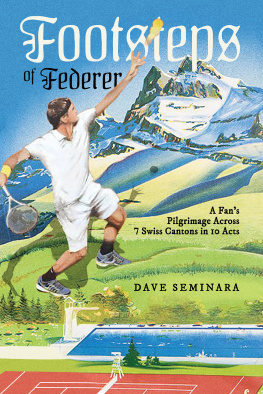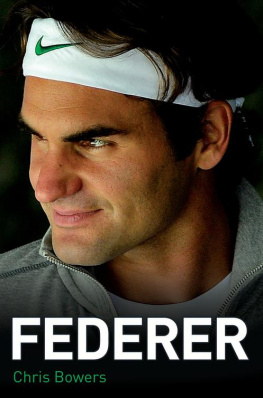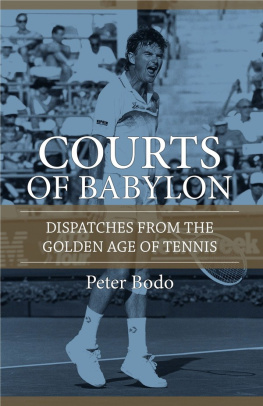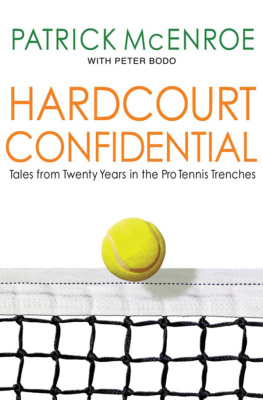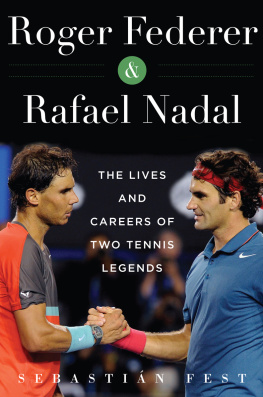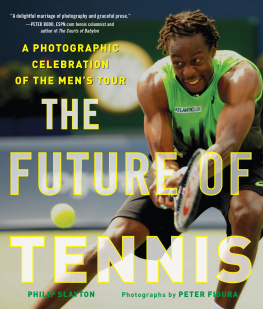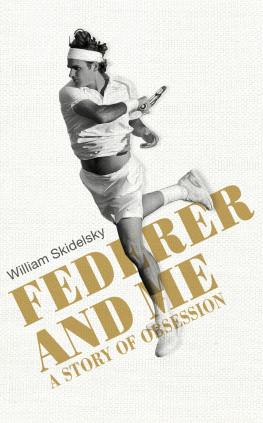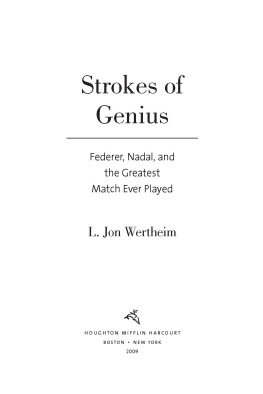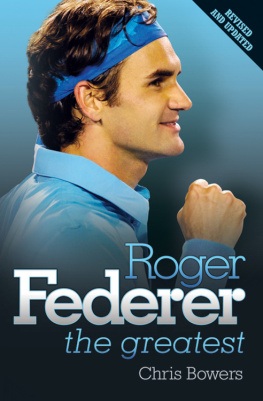Federer Roger - Roger Federer: quest for perfection
Here you can read online Federer Roger - Roger Federer: quest for perfection full text of the book (entire story) in english for free. Download pdf and epub, get meaning, cover and reviews about this ebook. City: New York;NY;Switzerland, year: 2010;2006, publisher: New Chapter Press, genre: Non-fiction. Description of the work, (preface) as well as reviews are available. Best literature library LitArk.com created for fans of good reading and offers a wide selection of genres:
Romance novel
Science fiction
Adventure
Detective
Science
History
Home and family
Prose
Art
Politics
Computer
Non-fiction
Religion
Business
Children
Humor
Choose a favorite category and find really read worthwhile books. Enjoy immersion in the world of imagination, feel the emotions of the characters or learn something new for yourself, make an fascinating discovery.

- Book:Roger Federer: quest for perfection
- Author:
- Publisher:New Chapter Press
- Genre:
- Year:2010;2006
- City:New York;NY;Switzerland
- Rating:5 / 5
- Favourites:Add to favourites
- Your mark:
- 100
- 1
- 2
- 3
- 4
- 5
Roger Federer: quest for perfection: summary, description and annotation
We offer to read an annotation, description, summary or preface (depends on what the author of the book "Roger Federer: quest for perfection" wrote himself). If you haven't found the necessary information about the book — write in the comments, we will try to find it.
Roger Federer: quest for perfection — read online for free the complete book (whole text) full work
Below is the text of the book, divided by pages. System saving the place of the last page read, allows you to conveniently read the book "Roger Federer: quest for perfection" online for free, without having to search again every time where you left off. Put a bookmark, and you can go to the page where you finished reading at any time.
Font size:
Interval:
Bookmark:
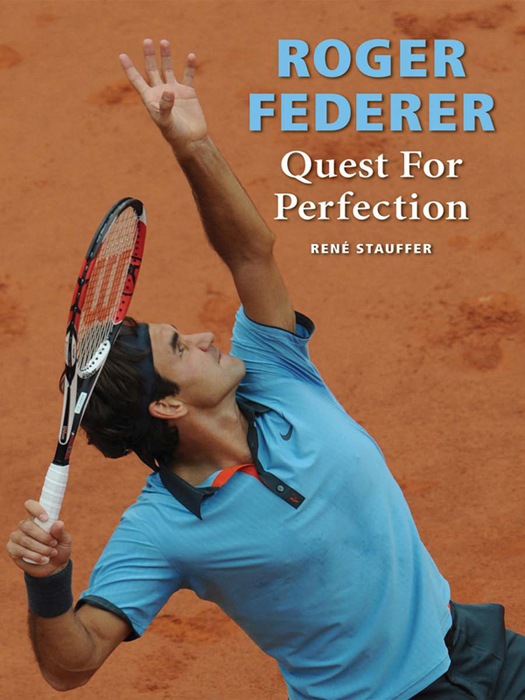

I made the decision to write a book about Roger Federer after Wimbledon in 2003, when he became Switzerlands first male Grand Slam champion. I had been covering Wimbledon for over twenty years and was well aware of the tremendous significance of this victory. I approached Roger and his parents with this idea, but they were of the opinion, however, that his story had only just begun and that it was too early to write a biography about a 22-year-old. I have to admit that they were rightbut just a few years later, Federers place in history became evidentin the circle of the all-time greats, next to players such as Bjrn Borg, Pete Sampras, Rod Laver or Fred Perry.
This book attempts to demonstrate how long and difficult Federers way to the top has been, what was preventing him from developing his tremendous talent more quickly, how he finally managed to exploit his potential and how extraordinary his winning streaks in this competitive international sport have been. The book also puts a light on Federers surroundings and the people who were vital in his quest for perfection.
As the proverb goes, a prophet is not without honor save in his own country. In the case of Federer, his accomplishments and talents as a sportsman, ambassador and role model of universal dimensions also generally seem to be more highly regarded by those outside the Swiss border. If some readers become more aware of what a godsend Federer has been for tennis and for sports in general, as an athlete as well as a human being, then this book has already accomplished very much.
In viewing the materials that I have gathered in folders, electronic archives and personal recollections of him over the past dozen years, the thought occurred to me over and over again that Roger Federer may be the athlete who has conducted the most interviews. There likely isnt any question that he hasnt been asked. Federer answers all of them again and again with admirable patience; he deals with us members of the media collegially and candidly. Again and again, he takes extra time for his countrymen even if he doesnt have to and even if almost everything has been said. With pleasure, I want to thank him for all of his collaborations with me through the years.
Working on this book, it has also become clear to me how much has happened to him and around him in such a short span of timethings that are worth repeating or recordingall the more so because sometimes important contexts only become visible at a greater distance. A feeling of astonishment always comes over me at how this ambitious, dissatisfied junior developed into one of the greatest figures in the sports worldparticularly in light of the fact that his character has hardly changed. Aside from his athletic ambition, Roger Federer has remained a modest man who doesnt think that hes anybody special. If he does make unpopular decisions, then this is usually due to his realization that they are necessary in order to achieve his lofty career goals.
While Federer continues to write his history at breath-taking speed that will hopefully fill many more folders and archive files, I would like to thank some other people who helped me with this book. I especially want to mention Randy Walker, who I started to know and appreciate while he was working for the U.S. Tennis Association and who was the driving force in setting up the English version for New Chapter Press. He brought a lot of new enthusiasm into this work and I thoroughly enjoyed the process of updating and adapting the book.
I also want to thank Pendo publishing in Munich and Zurich who took the initiative and offered me an opportunity as a career change to write this book. I want to thank the many people I interviewed or who provided information, who were willing to share their recollections or their knowledge about Roger with meespecially his parents. I also want to mention the many international and Swiss colleagues on the tennis tour who have accompanied Roger over the years, who have described and pointed out that what he has achieved is anything but average, especially for a small nation like Switzerland. Furthermore, I want to acknowledge the precious help of the media departments of the ATP with Nicola Arzani and Greg Sharko, an unfailing source of great stats and information, and of the ITF, above all Barbara Travers and Nick Imison.
I would also like to thank Tamedia AG, my boss, Fredy Wettstein, and the colleagues at the sports editorial office of the Tages-Anzeiger and the Sonntags-Zeitung who made it possible and helped me to accompany Federers development in a journalistically diverse way and to hopefully do appropriate honor to his accomplishments. I would also like to thank my good friend Jrgen Kalwa in New York, who wrote a book about Tiger Woods, who supported me with important tips, as well as my sister Jeannine who was the first one to critically read this manuscript and provided me with valuable feedback. Last but not least, I would like to thank my wife, Eni, and our daughter Jessica. It wasnt easy for any of them to have me at home an entire winterbut mostly behind closed doors and in another world.
Ren Stauffer
Mllheim, Switzerland
It was September 11, 1996. I was on assignment for the Tages-Anzeiger and was supposed to write a story about the World Youth Cup, a sort of Davis Cup for juniors that was being played in Zurich, the location of our editorial office. I was skeptical. A story about a team tournament involving obscure 15 and 16-year-old tennis playerswho would be interested in that? I viewed this assignment as a tiresome task, thanks to the Swiss Tennis Federation since they had charitably taken on the tournament for its 100-year anniversary. No, this certainly would not be an interesting assignment.
On this day, I met Roger Federer for the first time. He played on a far away court surrounded by wire mesh at a tennis and recreation facility called Guggach. Officials from the Swiss Tennis Federation told me that Federer was a pretty good player and that there was little to criticize except that he was sometimes very temperamental. He just turned 15 and was actually too young for this tournament, but his credentials were impressivehe had already won five Swiss national junior championship titles, was the best Swiss player in the 16-and-under age bracket and was already ranked No. 88 nationally.
On this day, he played against an Italian named Nohuel Fracassi, who since this encounter with Federer, I never heard from again. Fracassi was more than a year older, bigger and stronger than Federer and he had already won the first set when I arrived. The mood was reminiscent of an insignificant club tournament. There were three or four spectators, a referee and no ball boys. The players fetched the balls themselves. However, I was instantly fascinated by Federers elegant style. I had already seen some players come and go in my fifteen years as a tennis journalist but it appeared to me that an extraordinary talent was coming of age here in front of me. He effortlessly put spins on balls so that the Italianeven on this slow clay courtwould often just watch the ball fly past him for winners. With hardly a sound, he stroked winning shots from his black racquet, moved fast and gracefully. His strokes were harmonious and technically brilliant.
His tactics were also quite unusual. There were no similarities to the safe and consistent Swedish School of baseline tennis that was very common back then and usually resulted in promised success on clay courts. Federer would have nothing of that. He looked to end points quickly at every opportunity. He appeared to have mastered every stroke, which was quite unusual for juniors in his age group. He dominated with his serve and his forehand, but his powerful one-handed backhand and the occasional volley also looked like something taken from a tennis textbook.
Font size:
Interval:
Bookmark:
Similar books «Roger Federer: quest for perfection»
Look at similar books to Roger Federer: quest for perfection. We have selected literature similar in name and meaning in the hope of providing readers with more options to find new, interesting, not yet read works.
Discussion, reviews of the book Roger Federer: quest for perfection and just readers' own opinions. Leave your comments, write what you think about the work, its meaning or the main characters. Specify what exactly you liked and what you didn't like, and why you think so.

